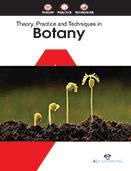Agriculture and Life Sciences

When it comes to big science news, the field of botany—the branch of biology dealing with plant life—always seems to end up looking like the shy kid that gets left out. People seem to have an image of botanists that includes adorably elderly glorified gardeners who are kneeling in the soil with little spades while planting flowers. But botany is actually at the forefront of science. Plants are unique and essential to life on earth. Unlike most living things, plants make their own food from sunlight and water. Either directly or indirectly, they are the primary food source for humans and other animals. Additionally, they provide fuel, replenish the earth’s oxygen supply, prevent soil erosion, slow down wind movement, cool the atmosphere, provide wildlife habitat, supply medicinal compounds and beautify our surroundings. Understanding how plants grow and develop helps us capitalize on their usefulness and make them part of our everyday lives.
This book ‘’Theory, Practice and Techniques in Botany’’ provides a modern and comprehensive overview of the fundamentals of botany. The clear, concise text focuses on major themes of plants, conservation biology, evolution, and biotechnology and gives readers practical and relevant information about the world of botany. This book begins with a chapter focuses on vascular plants and closes on environmental biology.
Botany is surprisingly useful in areas we wouldn’t automatically consider it to have applications. Many of our early medicines come from plant extracts; aspirin developed as a result of the study of rotting tree bark and penicillin came from mould. With the effects of climate change expected to have a profound effect on our the world around us, especially on plants as we rely on them to provide carbon sinks amongst other things, the need to study botany is as important today as it ever was. A good understanding of plants is crucial to the future of human societies as it allows us to: